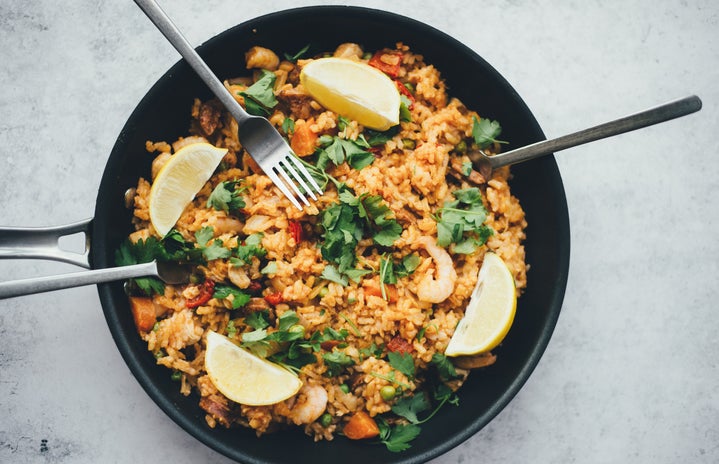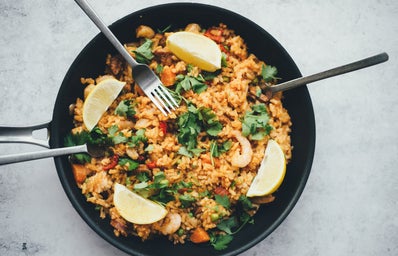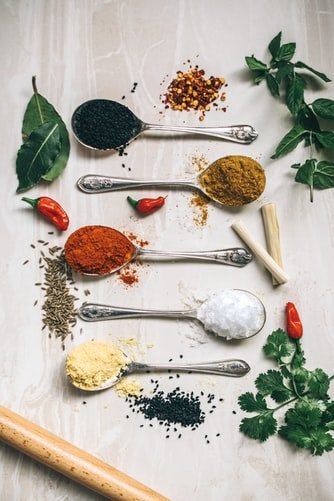Like many other college students, when I moved into my first apartment, I strived to maintain healthier eating practices. I started incorporating healthy meals, adding more veggies into my diet, and cooking more meals at home rather than eating out. I researched healthy recipes and catered my grocery shopping towards these new nutritional items I planned on working into my regular diet. So many articles, blogs, and social media posts showed me all these recipes that I thought I could regularly start eating, but at some point, I got bored of the meals so quickly and didn’t have an appetite for them. This healthy eating lifestyle and eating well was so hard for me to sustain, but why?
As a first-generation Indian-American college student, my immigrant parents raised me with heavy cultural influences, reflecting upon the food I ate every day. There was no question about it — whether it was breakfast, lunch, or dinner, we were eating home-cooked Indian food. We would rarely go out to eat, and very occasionally would my mom cook non-Indian food. Even though I would sometimes get jealous of my friends, who were eating burgers and fries for dinner, I never got bored of it. I ate the same variety of meals every day for eighteen years and became accustomed to it.
Being used to a specific cultural diet for so long makes the transition to college a lot harder, however. I definitely needed some time to get used to eating everything but Indian food on a regular basis. But as I started creating these goals of eating healthier, I realized how difficult it is for immigrants and children of immigrants to fit into these Western ideals of health and nutrition. Every health source I looked into for healthier recipes failed to include authentic cultural recipes of any cuisine. At best, I would see a very Americanized version of my favorite Indian meals that once again fit into the Western idea of a “perfectly balanced meal.” The health benefits of certain cultural dishes or ingredients are rarely recognized, and in turn, are never incorporated into any healthy recipes we see online.
This realization made me eager to start making more Indian food that would still meet my goals of having better eating practices while also allowing me to enjoy the process. But to no surprise, another obstacle prevented me from doing so. Exploring healthy and well-balanced diets in the United States as an immigrant is hard as it is, but the added intersection of being a college student makes it even harder. Cultural dishes need a very different range of ingredients compared to what most regular grocery stores offer. But since none of them even make these ingredients accessible, most families like mine go to specific stores that do, such as an Indian marketplace. Davis doesn’t have a single Indian store.
So even if I were able to find more ethnically diverse healthy recipes, I wouldn’t have the resources to make them! With most grocery stores providing the essentials only for Western diets and, at best, very few items for cultural dishes, I, along with many other first-generation college students, face such a struggle navigating how to incorporate our cultural diets from home into our lives here in Davis. It is difficult enough transitioning and changing a diet you have been so used to at home. On top of that, it is even harder to learn how to bring cultural recipes from home to college life. And to make matters worse, striving for the very common goal of maintaining health and nutrition is made even more difficult.
The lack of inclusion towards ethnic foods and ingredients creates challenges for first-generation students, and I don’t think we often realize this as we come into college. Going into my third year, I still feel like I am not fully accustomed to my meals now, nor do I feel like I can navigate healthy eating without structuring my eating habits with Western ideals. Moving forward, I can only hope that healthy, authentic Indian recipes are more accessible along with their ingredients so that immigrant families can meet healthy lifestyle goals without the challenges that Western diets pose to ethnic cuisines.



